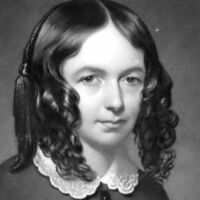
Elizabeth Barrett Browning
Elizabeth Barrett Browning (6 March 1806 – 29 June 1861) was one of the most prominent poets of the Victorian era. Her poetry was widely popular in both England and the United States during her lifetime. A collection of her last poems was published by her husband, Robert Browning, shortly after her death.
Elizabeth Barrett Browning (6 March 1806 – 29 June 1861) was one of the most prominent poets of the Victorian era. Her poetry was widely popular in both England and the United States during her lifetime. A collection of her last poems was published by her husband, Robert Browning, shortly after her death.
Barrett Browning opposed slavery and published two poems highlighting the barbarity of slavers and her support for the abolitionist cause. The poems opposing slavery include "The Runaway Slave at Pilgrim's Point" and "A Curse for a Nation"; in the first she describes the experience of a slave woman who is whipped, raped, and made pregnant as she curses the slavers. She declared herself glad that the slaves were "virtually free" when the Emancipation Act abolishing slavery in British colonies was passed in 1833, despite the fact that her father believed that Abolitionism would ruin his business.


